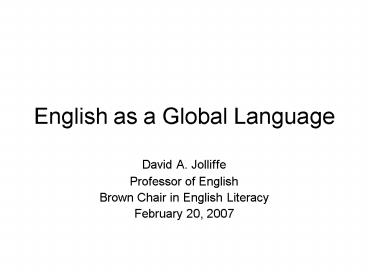English as a Global Language - PowerPoint PPT Presentation
1 / 17
Title:
English as a Global Language
Description:
French 130 million. Who is currently speaking or learning English? ... French, Spanish, Russian, and Chinese but the bulk of its business is conducted in English. ... – PowerPoint PPT presentation
Number of Views:12322
Avg rating:4.0/5.0
Title: English as a Global Language
1
English as a Global Language
- David A. Jolliffe
- Professor of English
- Brown Chair in English Literacy
- February 20, 2007
2
Source for todays lecture
- Crystal, David. English as a Global Language.
2nd edition. Cambridge, UK Cambridge UP, 2003.
3
Is English already global?
- Think about your travel experiences. Where have
you seen English that you didnt expect to find
it? What was noteworthy about the form and
structure of the English? Did you encounter
written English or spoken English or both? How
would you describe the linguistic abilities of
the person/people you were encountering?
4
How many people are currently speaking English
worldwide?
- The Worlds Ten Most Spoken Languages
- Mandarin 1,051 million
- English 510 million
- Hindi 490 million
- Spanish 425 million
- Arabic 255 million
- Russian 254 million
- Portuguese 218 million
- Bengali 215 million
- Malay, Indonesian 175 million
- French 130 million
5
Who is currently speaking or learning English?
- Non-native English speakers now outnumber native
ones 3 to 1. - Primary schools in major Chinese cities now begin
offering English classes in the third grade. - In Prague, the English language school offers
classes for two- and three-year-olds. - Workers preparing for the Beijing Olympics in
2008 are learning English. - At both the Peugeot and Toyota plants in the
Czech Republic, English is the working language.
6
The present and the future
- Three types of speakers are currently speaking or
learning English first-language,
second-language, and foreign-language. - About a quarter of the worlds population is
fluent or competent in Englishabout 1.5 billion
people by early in this millennium.
7
A realistic problem?
- As English becomes a global language, a sense
might develop that nobody owns it anymore. Is
that a problem?
8
What is a global language?
- A language that is given special statuspriority
in business, education, government, and so
onover native, mother-tongue languages - Special status can be conferred in two ways the
government can make it the official language,
or it can receive priority in schooling. Both
are true in Belize.
9
How does a language become global?
- Simply put the power of its peoplemilitary,
political, economic - English was at the right place at the right time
By the beginning of the 19th century, Britain
had become the worlds leading industrial and
trading company. By the end of the 19th century,
the population of the U.S. was larger than that
of any western European country, and its economy
was the most productive and fastest growing in
the world.
10
The upshot?
- As people from all over the world came to Britain
to learn about industrialization and to America
to learn about economy and corporate growth,
English was simply taken for granted.
11
Why do we need a global language?
- The more a community is linguistically mixed,
the less it can rely on individuals to ensure
communication between different groups. In
communities where only two or three languages are
in contact, bilingualism (or trilingualism) is a
possible solution, for most young children can
acquire more than one language with
unselfconscious ease. But in communities where
there are many languages in contact . . . such a
natural solution does not readily apply. (11)
12
In what contexts is a global language useful?
- International organizations The United Nations,
for example, has five official
languagesEnglish, French, Spanish, Russian, and
Chinesebut the bulk of its business is conducted
in English. - Academic and business communities Most
international academic conferences are conducted
in English, as are most international business
meetings.
13
Are there any possible drawbacks to having a
global language?
- Linguistic power Are those who speak the global
language as a mother tongue automatically have
more power than those who learn it as a second or
foreign language? - Linguistic complacency Will a global language
eliminate motivation to learn other languages?
14
A warning about complacency
- It is all too easy to make your way in the world
with English as your mother tongue . . . . We
become lazy about learning other languages. . . .
We all have to make a greater effort. English
may be the world language, but it is not the
worlds only language and if we are to be good
global neighbours we shall have to be less
condescending to the languages of the worldmore
assiduous in cultivating acquaintance with them.
Sir Sidrath Ramphal, former secretary general of
the British Commonwealth (19)
15
What about linguistic death?
- Will the emergence of a global language lead to
the disappearance of minority languages? (There
are about 6,000 or so living languages in the
world right now.) - A unfounded fear for now English as a global
language seems to have the opposite
effectstimulating a stronger support for local
languages than might have otherwise been the case.
16
An important truth about the nature of language
in general
- A global language meets a populations need for
mutual intelligibility. - A local language meets a populations need for
expressions of identity.
17
Two interesting statistics to conclude
- In the 2001 census, the Belizean population had
grown to 256,000. Of that number, 190,000 were
listed as minimally competent in English, and
56,000 spoke or read English as a second
language. - The world population in 2001 2,236,730,800. Of
that number, 329,140,800 were minimally competent
in English, and 430,614, 500 spoke or read
English as a second language.































